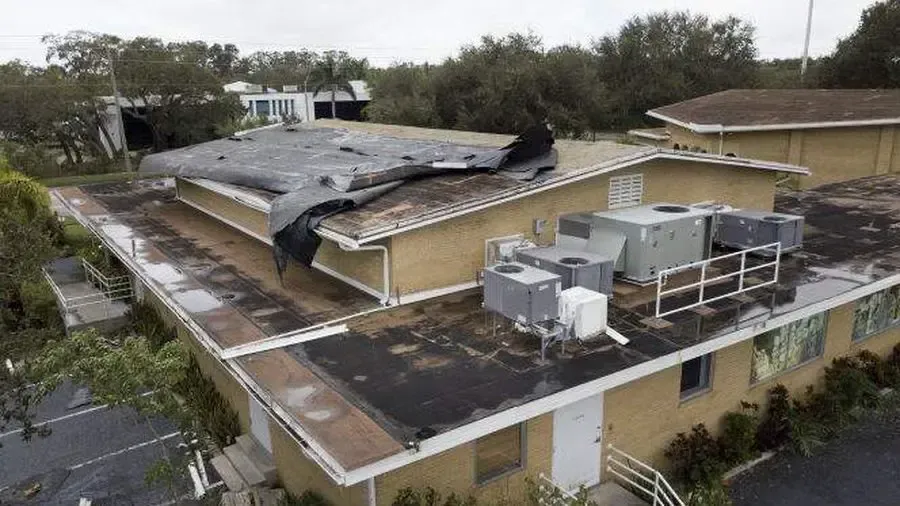Curtain Up, Storm Coming: How Tampa Bay Theaters Are Weathering Hurricane Season

By Avery Anderson
In Tampa Bay, the curtain doesn’t just rise and fall—it bends with the wind.
Each summer and fall, as Florida braces for hurricane season, local theaters brace with it. For companies still rebuilding after COVID-era losses, a week of closures—let alone structural damage—can mean tens of thousands in lost revenue, derailed schedules, and a whole lot of rescheduling stress.
Last fall, Tampa Bay got hit—twice.
In the span of weeks, Hurricane Idalia and Hurricane Milton swept through the region—one bringing storm surge, the other historic flooding. While the damage varied, the message for local theaters was clear: this isn’t just bad luck. This is the new normal.
The $50,000 Forecast
In 2022, Hurricane Ian shut down American Stage’s final week of Green Day’s American Idiot, wiping out five sold-out performances and an estimated $50,000 in lost revenue. Jobsite Theatre, performing at the Straz Center downtown, had to cancel three days of Picasso at the Lapin Agile, estimating $20,000 in losses on top of a COVID-related closure earlier that same run.
For artists and arts orgs already operating on tight margins, these cancellations aren’t just inconvenient—they’re existential. As Jobsite’s producing artistic director David Jenkins put it at the time: “The financial reality of a hurricane is, you can feel the effects for a week before the storm… and for weeks after.”
This Year’s Strategy: Flexibility, Community, and Smaller Casts
Fast forward to 2025, and theaters across the region are building smarter seasons.
At freeFall Theatre, which lost its roof during 2017’s Hurricane Irma, hurricane season is now a strategic consideration—not just an operational one. The company’s upcoming season opener—Andrew Lloyd Webber’s Tell Me On a Sunday—was intentionally scheduled with a small cast, an early-September start, and flexible end dates. If the storm hits? There’s room to extend.
“A smaller cast means payroll stays small if there are cancellations,” said actor and marketing director Matt McGee. “Trying to find and use as many local performers and musicians this time of year is also a choice.”
At Urbanite Theatre in Sarasota, Summer Dawn Wallace still remembers last year’s triple whammy: a once-in-a-century flood and two hurricanes during a single production. Urbanite leans on detailed contingency planning and a five-day rehearsal week, which doesn’t leave much flexibility to move things around.
“We have a five-day work week,” Wallace said. “So I don't have much calendar wiggle room to get shows in season.”
“One of the greatest challenges during hurricane season is making sure our guest artists are supported,” she added. “Many have never experienced a hurricane before, and being away from their homes, families, and usual support systems can add stress. We take that responsibility seriously and work hard to make sure they feel safe and cared for throughout.”
Their emergency protocol includes stocked kits, sandbag stations, artist relocation plans, and a robust phone tree.
LAB Theater: Coffee, Wi-Fi, and Community
For LAB Theater Project in Ybor City, last year’s Hurricane Milton became an unexpected opportunity for service. When the storm passed and LAB still had power, running water, and Wi-Fi, the team opened their doors—offering coffee, AC, charging stations, and a place to decompress.
“We swapped storm stories, shared laughs, and supported one another,” said executive producer Owen Robertson. “It was simple, but deeply meaningful.”
Now, it’s policy. If LAB has the ability, they’ll reopen after every storm—not for ticket sales, but for neighbors.
The Straz Center: Building-Wide Preparedness
With multiple theaters, on-site construction, and several resident companies, the Straz Center for the Performing Arts requires a hurricane plan that’s both expansive and exact.
“Hurricane preparation is a critical component of operational planning to ensure the safety of staff, artists, students, and patrons as well as the integrity of the facility itself,” said Chief Operating Officer Matthew Wolf.
Ahead of the 2025 season, the Straz implemented a five-point plan:
- Priority vendor agreements with debris removal, fueling, and roofing companies
- Diesel generator fuel stores topped off
- Storm supply inventories checked and replenished
- Pre-storm coordination with Creative Contractors overseeing on-site expansion
- All gutters cleaned in early June
The result is a system that can respond quickly, communicate clearly with ticket holders, and minimize interruptions across its performance schedule.
More Than a Nuisance
Florida’s hurricane season runs June through November. The riskiest weeks—mid-September to mid-October—overlap with the early weeks of most companies’ mainstage seasons. Even when the skies are clear, the forecast looms in audience behavior.
“Once a hurricane is mentioned,” Jenkins said in 2022, “all the oxygen is sucked out of the room. People aren’t buying tickets.”
That’s what makes the planning, flexibility, and community-focused thinking so essential—and so Tampa Bay. In a region that knows how to rebuild, theaters are proving once again: the show will go on. Just maybe with a rain delay.
